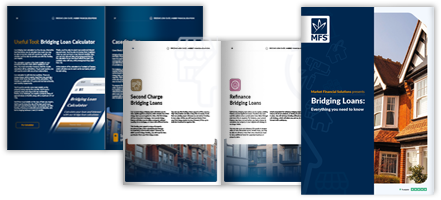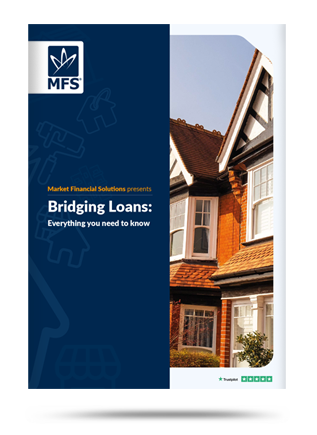Market Financial Solutions are a bridging loan and buy-to-let mortgage provider and are not legal, financial, investment or tax advisers. This document is for informational purposes only and does not, and should not be considered, to constitute legal, financial, investment or tax advice or be relied upon by any person to make a legal, financial, investment or tax decision. Therefore, Investors are encouraged to seek appropriate professional advice. The information in this content is correct at time of writing.

Here at Market Financial Solutions, we work with a mixture of brokers and direct clients. However, some of our borrowers tend to be unaware of what working with a broker would entail, when it comes to taking out a bridging loan. As such, we have pulled together this blog to outline everything you need to know about working with a bridging loan broker.
What Is a Bridging Loan Broker?
A bridging loan broker assists borrowers in obtaining short-term loans to bridge the gap between property transactions. For landlords, for example, a broker might secure a bridging loan to help them buy a property at auction and give them the breathing space to organise a longer-term financial solution, such as a mortgage.
What Does a Bridging Loan Broker Do?
When working with a bridging loan broker, their objective is easy. They try to identify the most appropriate bridging loan for your requirements, while securing the best terms possible. As such, bridging loan brokers work for you, their clients, not the lenders. They can secure a variety of bridging finance through their in-depth knowledge of the market and lenders.
Types of Bridging Offering
- Regulated Loan: A regulated bridging loan relates to securing a loan against a property that is currently, or will be, occupied by the owner or an immediate family member. If you plan to rent out the property, you will most likely need a buy-to-let loan or mortgage.
- Unregulated Loan: An unregulated bridging loan is a popular source of short-term finance. It’s for people looking to complete their property transaction quickly. Its flexibility allows for tailor-made solutions for your individual needs. Unregulated loans can mitigate a lot of the constraints regulated bridging loans are subject to. The difference between them is you or your immediate family not living in the property.
- Open Bridging Loan: An open bridging loan doesn’t have a fixed repayment date. It’s generally used when you don’t have a specific timeframe in place for repayment. This makes them incredibly useful if you are in the process of buying a new property and need funds quickly to finalise the deal but are unsure as to when your existing property will be sold.
- Closed Bridging Loan: A closed bridging loan has a defined exit strategy from the outset. Here, the lender involved will know how you plan to pay back the loan, at what date, and through what method. Often, this will involve a confirmed sale of a property, or clear long-term finance options, but can include other methods.
- Secured Bridging Loan: A secured bridging loan is secured by collateral, such as property or other assets.
- Unsecured Bridging Loan: An unsecured bridging loan does not require any collateral or security to be pledged. This means that the borrower doesn’t need to put up any assets to secure the loan. But the lender may charge a higher interest rate to compensate for the increased risk.
At Market Financial Solutions, we work with brokers representing all kinds of clients investing in England or Wales. However, we only offer unregulated bridging loans, with clearly defined exit strategies, that are secured against property.

Do I Need a Bridging Loan Broker, and What Are the Advantages of Working With One?
Whether or not you need a bridging loan broker really depends on your specific circumstances and needs. But, there are many ways in which brokers can be extremely helpful.
Indeed, when exploring bridging loans, a broker could help you access a much wider range of lenders that may not have been on your radar. A broker can also save you time as a borrower by doing the legwork on your behalf.
Brokers can also provide expert advice on the best lenders, or financial products, for your needs. They can negotiate the terms of a loan on your behalf, potentially helping secure a better deal. (Especially if the broker has a good relationship with the lender or access to exclusive rates or products).
However, it’s important to keep in mind that working with a broker may come with additional fees and charges. As such, it’s important to carefully consider the cost of using a broker and factor this into your budget before making a decision.
Are There Any Downsides to Working With a Bridging Loan Broker?
In truth, the downsides of working with a broker are hard to quantify, due to the advantages they can offer in return.
For instance, brokers often charge additional fees that can add to the cost of the bridging loan, while the borrower is not directly in control of the application process. This can risk causing delays or miscommunication. And, although brokers can help you access a wider range of products, they may only work with a limited number of lenders.
However, if a broker can find you a good deal with a reliable lender, then the positives may outweigh the downsides. As always, it’s down to you to decide what’s best for your property investment plans.
What Are the Costs of Working With a Bridging Loan Broker?
As mentioned above, brokers often charge additional fees. However, these costs can vary depending on the broker’s experience, the complexity of the loan, and the lender’s fees.
For the most part, bridging loan brokers charge a percentage of the loan amount as a fee, which is usually in the 1-2% range. However, your chosen lender may also pay the fee to the broker directly.
It’s also worth noting that some bridging loan brokers may charge an upfront fee. They may also require a deposit before they begin working on a loan application. It’s vital, therefore, to clarify any fees or costs associated with a broker’s services upfront. You will need to make sure you understand the charges you’ll be facing.
What Qualifications Should a Bridging Loan Broker Have?
There are no specific qualifications needed to become a bridging loan broker. However, there are several qualifications that you can look out for to determine how experienced or reliable a broker is.
These are some of the qualifications for brokers:
- CeMAP (Certificate in Mortgage Advice and Practice): This qualification is offered by the Chartered Institute of Bankers in Scotland (CIOBS). It’s widely recognised across the UK mortgage and specialist finance industry covering topics like law, regulation and mortgage products.
- NACFB (National Association of Commercial Finance Brokers) membership: The NACFB is a trade association that represents commercial finance brokers. Its members must meet certain standards of professionalism. There is also a code of conduct which they must adhere to.
- Certified Practitioner in Specialist Property Finance (CPSP): This qualification has launched specifically for the specialist finance industry. It was created by the London Institute of Banking and Finance (LIBF).
Outside of these formal qualifications, you should look to those brokers with the best track record and most experience. This can ensure you are working with a knowledgeable professional.
What Will the Broker Want to Know About Me?
When you approach a bridging loan broker, they will typically ask a few questions. This will help them get to grips with your needs and financial situation.
For instance, brokers will ask for the purpose of the loan. They will determine why you need a bridging loan and how you will use the funds. They’ll also want to know how much you are looking to borrow and for how long.
If the bridging loan is secured against a property as collateral, brokers will ask for more details about the value, condition, and location of the property.
They may then ask for proof of income and employment. This will determine your ability to pay back the loan. Often, this will include a credit history check to understand your reliability and determine the interest rate that the lender will offer you.
Finally, brokers will want to see that you have an exit strategy in place. So it’s clear that you have a plan for how the loan will be repaid.
The Complete Guide to
Bridging Loans
Everything you need to know
- Different bridging types
- Useful tools
- Apply them in real life
- Market insights & more





